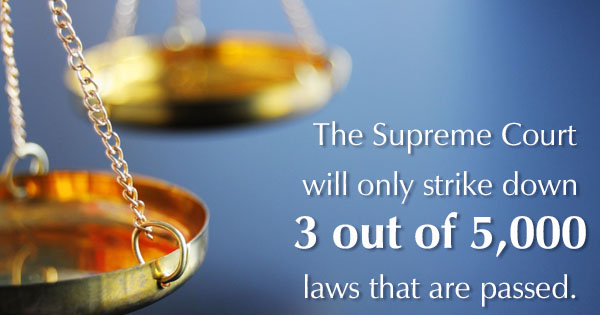
In your time doing law research, there’s a pretty good chance you’ve stumbled across a strange legal statute or two. For example, Sterling, Colorado has a legal statute forbidding cats from roaming around unless they’re wearing a taillight.
What makes such legal statutes even stranger isn’t their seeming lack of legislative intent, but rather the system that spawned them, if you think about it. Here’s how it’s weird.
Passing a Law Is a Lot of Work
Turning a bill into a law is a lot of work. First it’s introduced, and then handed off to a committee who makes changes to it and votes on it. Once the bill passes their muster, they put it on the calendar, scheduling it for debate. After that, a full vote occurs, and if it passes, the President has 10 days to either to sign it into law, or veto it. With so much work needed to create laws and legal statutes, it shouldn’t be any surprise that there are over 300 bills waiting for Senate action, or that the cumulative percent of bills enacted by Congress for December in the first year of a session is 33%.
“Rational Basis Review” Allows Judges to Use Their Own Discretion in Deciding What’s Constitutional and What’s Not
“Rational basis review” is a concept that allows courts to determine whether a law is “rationally related” to a “legitimate” government interest, whether it’s real or hypothetical. In other words, a person trying to strike down a law or legal statute needs to beat every single justification for the law, even if it’s made up or “hypothetical.” This might help explain why there are so many weird legal statutes on the books, as the situations which they apply to are unlikely, but could potentially happen. Hypothetically. What’s also strange is that according to recent legislative history research, rational basis review doesn’t appear anywhere in the Constitution, but it does show up in a tiny little footnote from a Supreme Court case in the 1930s involving federal milk regulations.
Hardly Any Laws Are Declared Unconstitutional
Believe it or not, barely any laws or legal statutes are declared unconstitutional. Between 1954 and 2002, there were more than 1 million laws passed by Congress and all 50 state legislatures, but the Supreme Court struck only 555 — a measly 0.054% — of these down. To be fair, each of those laws may very well have all been constitutional, but that’s still a pretty shocking number. Put another way, the Supreme Court will only strike down three laws for every 5,000 that are passed.
Do you know of any additional strange legal facts? Let us know in the comments.
